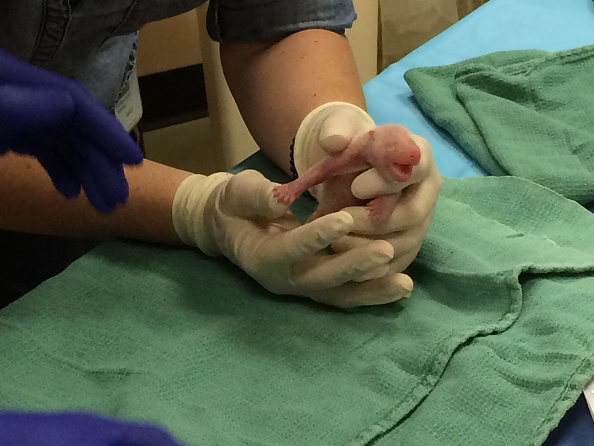These are the steps being taken to ensure the National Zoo's new panda twins survive


A free daily email with the biggest news stories of the day – and the best features from TheWeek.com
You are now subscribed
Your newsletter sign-up was successful
At the Smithsonian's National Zoo, staff members are still celebrating the birth of panda twins over the weekend, and have a plan to ensure the delicate cubs survive.
Iframe Code
The Week
Escape your echo chamber. Get the facts behind the news, plus analysis from multiple perspectives.

Sign up for The Week's Free Newsletters
From our morning news briefing to a weekly Good News Newsletter, get the best of The Week delivered directly to your inbox.
From our morning news briefing to a weekly Good News Newsletter, get the best of The Week delivered directly to your inbox.
"A lot of things have to happen," chief veterinarian Don Neiffer told The Guardian. "Until the cubs are both out walking around, acting normal, being a panda, that's probably when we'll exhale." Mei Xiang gave birth to healthy twins Saturday weighing 4 ounces and 3 ounces, respectively, but pandas that give birth to twins often only care for one and let the other die. In China, breeders have developed a system where cubs are swapped out every few hours, so each one has the opportunity to nurse and bond with the mother, while the other panda is in an incubator. Now, panda twins have a survival rate of more than 80 percent — much higher than the 20 percent chance two decades ago.
Iframe Code
Officials say they will use the swapping method as long as Mei Xiang lets them, and the first swap on Sunday morning was a success. One of the cubs let out a squeal when it was taken away — a sign of good health — and both are pink with just a tiny amount of white hair. There are no plans to bottle feed the cubs, unless they become underweight or their health declines. The zoo won't know if the cubs are male or female for three to four more weeks, and per Chinese tradition, they won't be named until they are 100 days old. Because pandas are endangered, the team is especially hopeful that the cubs will continue to thrive. "We've all been involved in events that don't go so well, so we are ecstatic that things are going great," Neiffer said. The zoo is already home to Mei Xiang's other two living cubs — Tai Shan and Bao Bao, who turned two on Sunday and celebrated with a bamboo, apple, and honey cake.
A free daily email with the biggest news stories of the day – and the best features from TheWeek.com
Catherine Garcia has worked as a senior writer at The Week since 2014. Her writing and reporting have appeared in Entertainment Weekly, The New York Times, Wirecutter, NBC News and "The Book of Jezebel," among others. She's a graduate of the University of Redlands and the Columbia University Graduate School of Journalism.
-
 Are Hollywood ‘showmances’ losing their shine?
Are Hollywood ‘showmances’ losing their shine?In The Spotlight Teasing real-life romance between movie leads is an old Tinseltown publicity trick but modern audiences may have had enough
-
 A dreamy long weekend on the Amalfi Coast
A dreamy long weekend on the Amalfi CoastThe Week Recommends History, pasta, scenic views – this sun-drenched stretch of Italy’s southern coast has it all
-
 Can foster care overhaul stop ‘exodus’ of carers?
Can foster care overhaul stop ‘exodus’ of carers?Today’s Big Question Government announces plans to modernise ‘broken’ system and recruit more carers, but fostering remains unevenly paid and highly stressful
-
 Nobody seems surprised Wagner's Prigozhin died under suspicious circumstances
Nobody seems surprised Wagner's Prigozhin died under suspicious circumstancesSpeed Read
-
 Western mountain climbers allegedly left Pakistani porter to die on K2
Western mountain climbers allegedly left Pakistani porter to die on K2Speed Read
-
 'Circular saw blades' divide controversial Rio Grande buoys installed by Texas governor
'Circular saw blades' divide controversial Rio Grande buoys installed by Texas governorSpeed Read
-
 Los Angeles city workers stage 1-day walkout over labor conditions
Los Angeles city workers stage 1-day walkout over labor conditionsSpeed Read
-
 Mega Millions jackpot climbs to an estimated $1.55 billion
Mega Millions jackpot climbs to an estimated $1.55 billionSpeed Read
-
 Bangladesh dealing with worst dengue fever outbreak on record
Bangladesh dealing with worst dengue fever outbreak on recordSpeed Read
-
 Glacial outburst flooding in Juneau destroys homes
Glacial outburst flooding in Juneau destroys homesSpeed Read
-
 Scotland seeking 'monster hunters' to search for fabled Loch Ness creature
Scotland seeking 'monster hunters' to search for fabled Loch Ness creatureSpeed Read
